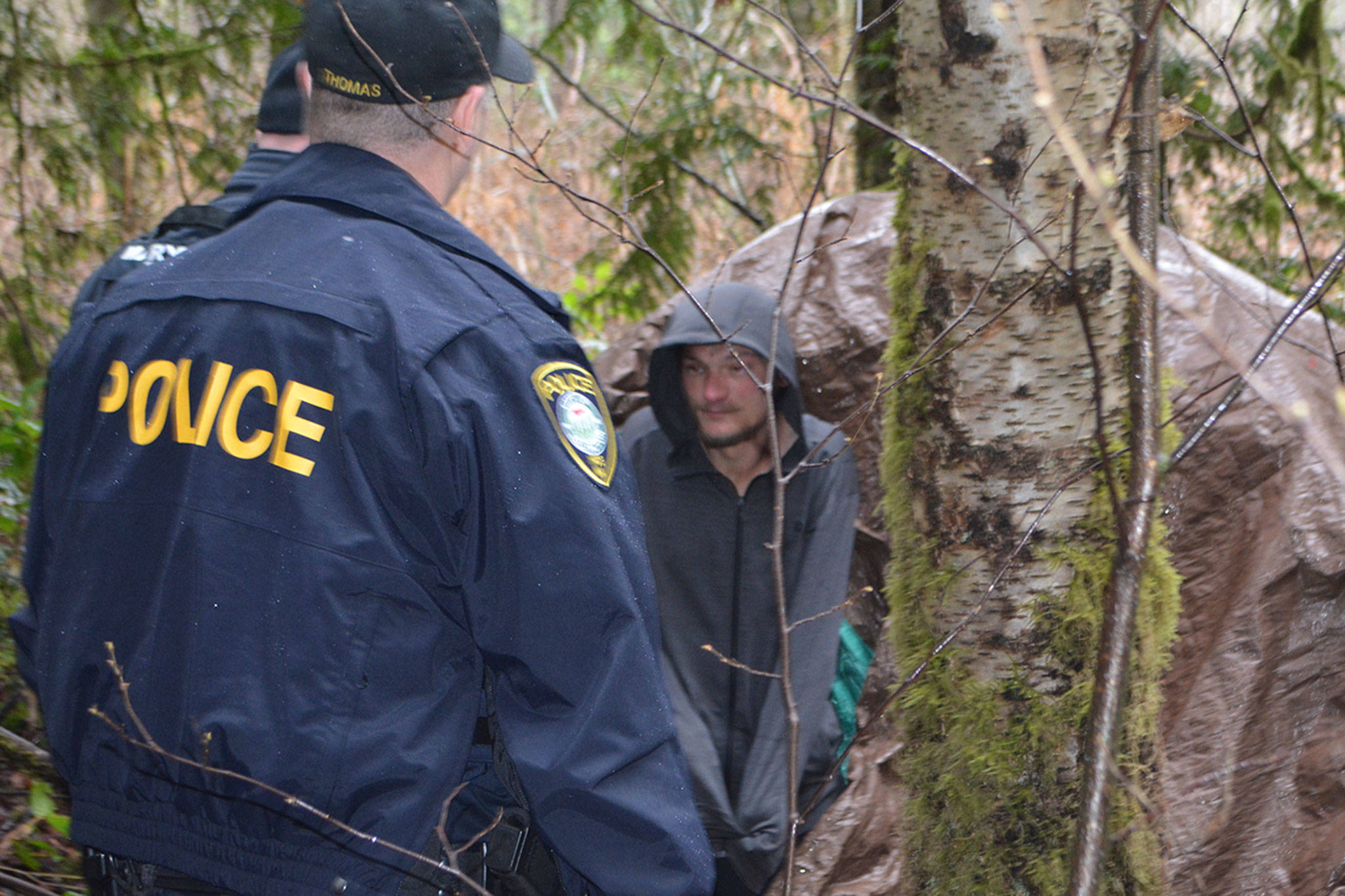LAKEWOOD – Daniel and Lisa were in a tent in a homeless encampment early Thursday afternoon.
Marysville Police Officer Mike Buell and Arlington Officer Ken Thomas approached the tent and asked if they wanted to talk.
Despite the uneasiness in his voice, Daniel did. The officers explained they are part of a new program in North Snohomish County that wants to help the homeless.
With the officers were two newly hired social workers – Rochelle Long for Marysville and Brittney Sutton for Arlington. They talked to Lisa mostly about the opportunities available to help them get off drugs, including detox, treatment and temporary housing.
While the couple did not go with them, Thomas was confident they eventually would. The only other option is incarceration.
The tour of the homeless encampment came after a meeting of city and county officials nearby at The Lodge housing development. The meeting was to announce the start of a new Office of Neighborhoods in North County. Marysville Mayor Jon Nehring and Police Chief Rick Smith continued to champion some of their views on homelessness and the drug epidemic.
Nehring said he wants to “offer these people real help and wrap services around them.”
He added that cycling them through the jail system doesn’t work. “It’s the only way out for this problem.” And, “It’s the compassionate thing to do.”
He said officers and social workers will be going out in the woods to meet the homeless where they live. “I hope they take us up on it,” he said of available services. Nehring said it’s a two-pronged approach because if they don’t choose the path to a better life law enforcement will get tough with them.
“If they reject the help, we’re not going to feed their drug addiction,” he said.
Smith said Sheriff Ty Trenary helped change his way of thinking. “We can’t arrest our way out of this,” Smith said.
He introduced Buell. Even though he is new to this position, Smith said Buell has been helping the homeless at least since he became chief 11 years ago. So he’s perfect for the job. “It takes a special breed of cop and social worker” to work together, he said.
Like Nehring, he said he will be “somewhat patient. It’ll be a bed of comfort for a time.” But if homeless don’t choose recovery, “We’ll address the criminal transient issue.”
Trenary, who has similar Office of Neighborhoods in south county and Monroe, said he used to be like Smith solving problems with, “A pair of handcuffs and a trip to jail.”
But he said issues such as drugs and homelessness are more complex. He started noticing that 30 percent, of about 40 people, of the jail population each day were heroin addicts. He found out 53 people had been arrested over 30 times and 80 percent of them were addicts. Instead of that, how about “getting them off the streets and into healthy lifestyles?” he asked.
Trenary said a major problem now is not enough services locally. Most who want help have to be sent out of this area. So, the county is working on a 44-bed diversion center, remaking the Carnegie building and revamping Denney Juvenile Justice Center. The sheriff said law enforcement isn’t getting soft. “This isn’t a hug-a-thon,” he said.
Arlington Mayor Barb Tolbert said the governments working together, especially in the Smokey Point area, offers a path forward for troubled individuals instead of shuffling them from one jurisdiction to another.
“I’m very pleased that we no longer have that ‘hamster wheel’ of sending people around, but actually are going and finding where they’re at, and offering them a true path to a different style of life,” she said.
Arlington Police Chief Jonathan Ventura said law enforcement has to change.
“And as you know, if you’re a hammer, everything looks like a nail,” he said. “It’s time to change that paradigm.”
Ventura introduced Thomas as Arlington’s lead in the embedded social worker program. When he asked Thomas why he was interested in the program, the officer said “he was interested in seeing something different that hadn’t been seen in law enforcement before…”
Ventura also introduced Sutton, who started on Monday.
Thomas got a head start three months ago, gaining contacts, going out to the camps and establishing a rapport with some homeless.
“In the short time that he’s been doing this, Ken has been able to get five people into treatment, a dozen people in assessments, and he has a dozen more lined up to get assessments in line for treatment,” Ventura said.
Snohomish County Councilman Nate Nehring, who represents this area, said he likes the innovative approach the county is taking with the cities.
“It’s a great alternative to jail and less expensive,” he said.
“We will absolutely work with you and for you to get you the services that you need, whether it’s housing, treatment, job training, whatever it is,” Nate Nehring said. “But we will absolutely not tolerate, and will not enable, a lifestyle of heroin and opioid abuse, of committing property crimes, and of destroying neighborhoods in our communities.”
Nate Nehring authored a law that just went into effect Wednesday that makes it easier for the county to crack down on nuisance properties. The police and social worker teams will also go to those sites to help those with addiction issues there.
“This new ordinance will give law enforcement better tools to more effecitvely and efficiently address the nuisance homes and encampments that are bringing crime and drugs into Snohomish County neighborhoods,” Trenary said. “We need to hold drug dealers accountable, and we need to find drug treatment for addicts.”
– Arlington Times reporter Douglas Buell contributed to this report.



